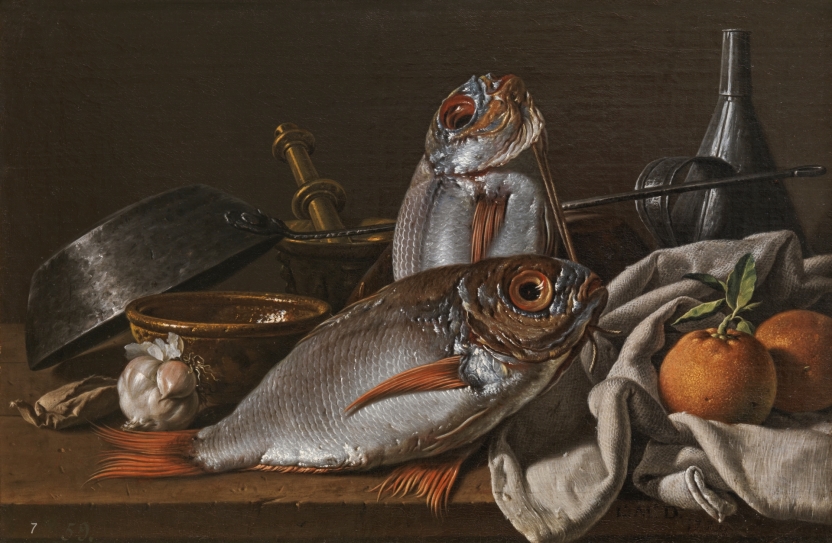
Still Life with Bream, Oranges, Garlic, Condiment, and Kitchen Utensils by Luis Egidio Melendez (1772)
by Phyllis Chesler
And here we have yet another parsha that is bursting-full, that covers so much, almost too much…I have post-it notes all over my Chumash and guess what? I am no longer drawn to what drew me close and challenged me last year or the years before. My reward for even a meagre bit of Torah study is that God has not only granted me another year, but another parsha as well. Themes and details, new to me, emerge. This year I was, for the first time, drawn to the meaning of God commanding us to “light the lamps”—of learning, knowledge, ethics, prophecy? And by God’s establishing orderliness, rosters of mishkan duty, appointed dates. And drawn to this question: If Moshe is the most “humble” of men—why does he need, first Yitro, now God, to tell Moshe that he cannot carry the burden of judgement and prophecy without appointing others to help him? Did such a “humble” man think he could Do It All?
And suddenly, it became clear to me why God became so very angry, not only at Miriam who, according to Rashi may not have critcized Moshe for having married a Cushite woman or for being so God-obsessed that he failed his marital responsibilities—no, for something else entirely. The people are complaining that the manna is boring, tedious, that they crave meat, but they ask for “fish” which was free (“hinam”) in Egypt. What are they really complaining about? The great Nehama Leibowitz (and others) explain that the word “hinam,” usually taken as “free” Egyptian fish, cucumbers, onions, and garlic, rather means “free” from religious obligations. Maybe we were embittered by slavery but at least we were “free” from religious demands. Leibowitz writes:
“But when the Israelites went forth from slavery to freedom, another bondage was imposed on them, more difficult and majestic in its awesomeness—the yoke of Torah and mitzvot imposed on them at Sinai—self-discipline in the life of the community and individual, in family life and relations with neighbors, on workdays and restdays, in matters of food and drink and clothing and, most important, in matters of sex…this yoke of freedom appeared to those accustomed to slavery, as burdensome and irksome. And this, in the view of our Sages, was the cause of the grumblings about water, bread, meat, and the fish they ate for nothing in Egyptian bondage.”
I wonder what I’ll see next year in this parsha?
- Like
- Digg
- Del
- Tumblr
- VKontakte
- Buffer
- Love This
- Odnoklassniki
- Meneame
- Blogger
- Amazon
- Yahoo Mail
- Gmail
- AOL
- Newsvine
- HackerNews
- Evernote
- MySpace
- Mail.ru
- Viadeo
- Line
- Comments
- Yummly
- SMS
- Viber
- Telegram
- Subscribe
- Skype
- Facebook Messenger
- Kakao
- LiveJournal
- Yammer
- Edgar
- Fintel
- Mix
- Instapaper
- Copy Link








